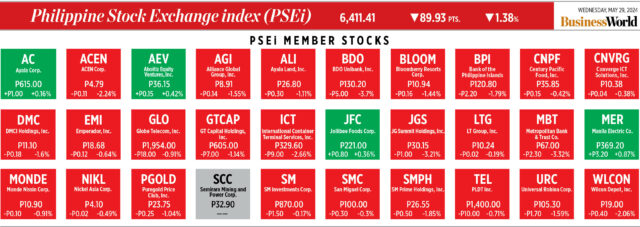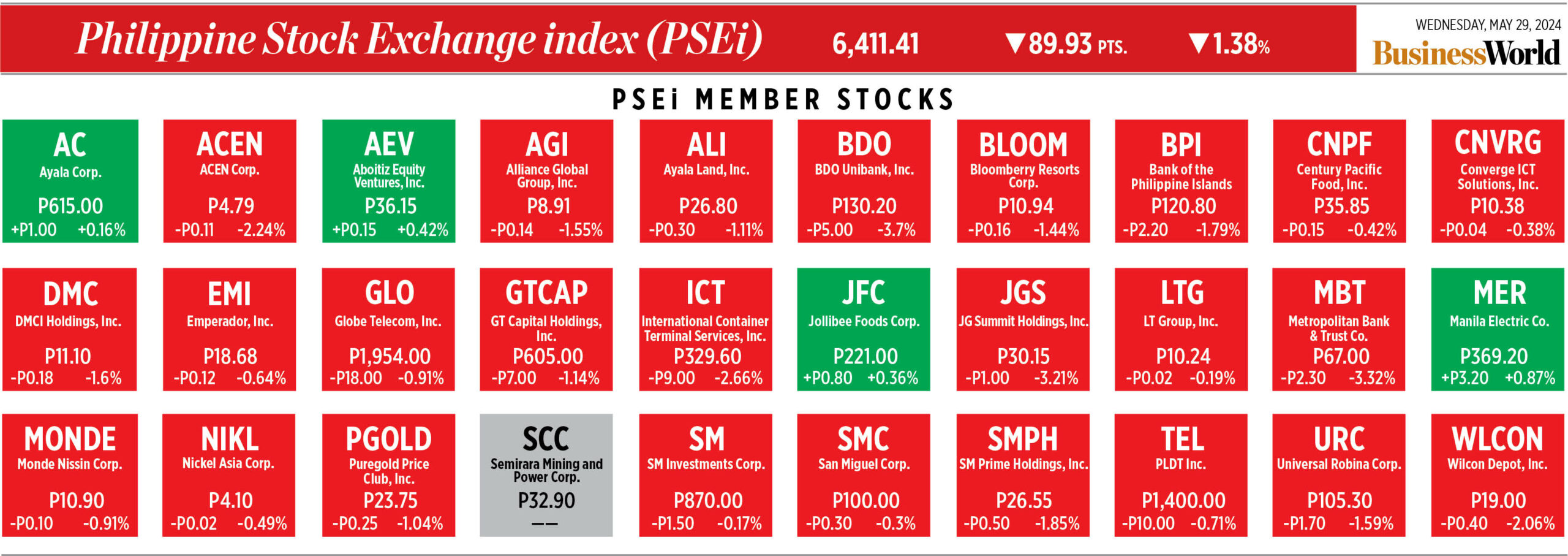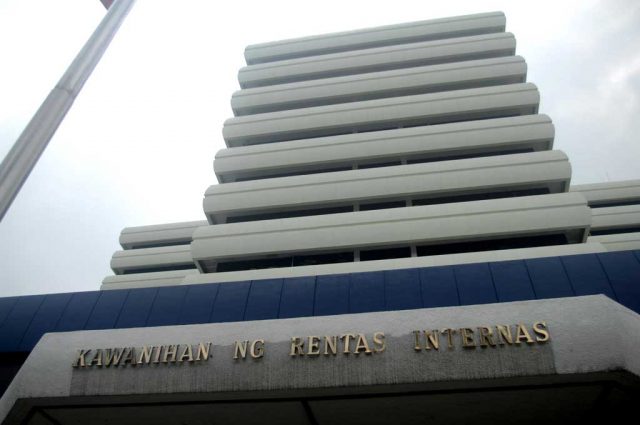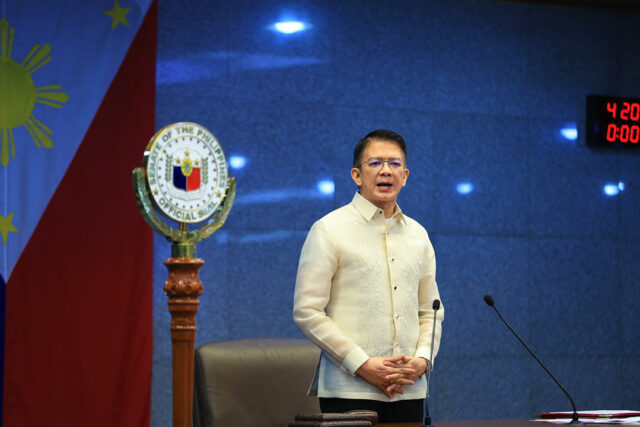PHL to develop 2 trade corridors with Brunei, seeks supply security
By Kyle Aristophere T. Atienza, Reporter
PHILIPPINE President Ferdinand R. Marcos, Jr. said on Wednesday that his country and Brunei would focus on developing two economic corridors, one of which would cover parts of Mindanao and Palawan, in a bid to boost their integration into regional supply chains.
An economist said this is an important development in minimizing the country’s exposure to potential supply chain disruptions should the trade war between the United States and China flare up.
“I am pleased to highlight that the Philippines and Brunei are particularly focused on two key economic corridors: the West Borneo Economic Corridor, encompassing Brunei Darussalam, and the Greater Sulu-Sulawesi Corridor, covering Palawan and parts of Mindanao,” Mr. Marcos said at a business forum in Brunei, based on a transcript from his office.
These corridors are “strategically designed to integrate production with supply chains, offering abundant opportunities for SMEs to flourish.”
The Philippine leader began his two-day state visit to the petroleum-rich country on Tuesday.
The economy of the Philippines expanded by 5.3% last year, while that of Brunei grew by 1.4%.
Mr. Marcos, at the business forum, also cited the potential of his country’s minilateral economic cooperation with Brunei and two other members of the Association of Southeast Asian Nations (ASEAN) to build a production hub in the region.
Investors should look at the Brunei Darussalam–Indonesia–Malaysia–Philippines East ASEAN Growth Area (BIMP-EAGA), which he said was “a beacon of economic integration and development within ASEAN.”
It could pave the way for “a unified ASEAN production base,” Mr. Marcos said.
The intergovernmental economic cooperation program could enable “robust supply and value chains while supporting the development of small and medium-sized enterprises (SMEs) in key productive sectors.”
He said the four-way grouping “sees incredible potential” in agribusiness, renewable energy, and the Halal supply chain.
“With the region experiencing a steady rise in population and income, the market for goods and services is expanding rapidly and significantly,” he added. “This growing market presents numerous opportunities for businesses and investors to capitalize on.”
John Paolo R. Rivera, president and chief economist at Oikonomia Advisory & Research, Inc., said boosting the Philippines’ integration into the BIMP-EAGA and exploring more ASEAN-centered partnerships would make the country resilient in the face of heightening geopolitical tensions and economic risks inside and outside the region.
“If neighboring countries cooperate, risks from other regions threatening their economies are reduced,” he said in a Facebook Messenger chat, citing the ongoing trade war between the United States and China.
The Marcos administration is on a mission to forge more economic partnerships with friendly nations amid increasing tensions with China, which claims the South China Sea almost in its entirety including waters within the Philippines’ exclusive economic zone.
However, Leonardo A. Lanzona, who teaches economics at the Ateneo de Manila University, warned against the absence of a guiding policy that may render these partnerships as “disjointed and confusing programs.”
“All of these economic agreements are necessary but are not sufficient,” he told BusinessWorld via Messenger chat.
Mr. Lanzona said the Philippines must create a comprehensive industrial policy “under which all of these international agreements are subsumed.” “Without this policy, all of these agreements are just for show,” he said.
INT’L TRADE LANDSCAPE
China is the Philippines’ largest source of imports and second-largest export market. On the other hand, the United States, a major defense ally that has backed Manila amid Beijing’s intrusions at sea, is the largest destination of Philippine products and the fifth-largest source of imports.
The US and China have been locked in a trade war since 2018, when former President Donald J. Trump slapped investment controls and tariffs on hundreds of billions of dollars’ worth of Chinese products due mainly to alleged unfair trade practices by Beijing.
US President Joseph R. Biden, Jr., who is running for his last reelection, has kept the tariffs and imposed more restrictions. He has called the US-China conflict “a battle between the utility of democracies in the 21st century and autocracies.” His opponent, Mr. Trump, has vowed to impose more tariffs on Chinese goods if he wins in November.
The European Union (EU), the Philippines’ fourth largest trading partner in 2022, is also seen sliding into a trade conflict with China as it investigates whether Chinese electric vehicles have been unfairly subsidized by Beijing. The EU’s trade deficit with China hit €300 billion last year.
China, in return, has hinted at restricting the entry of European luxury cars as well as hog meat.
The Philippines on Tuesday said it had signed several deals with Brunei to boost ties in food security, agriculture, tourism, and maritime domain.
Mr. Marcos said he expects the renewal of a Memorandum of Understanding with Brunei to boost trade in food products and services.
“With [its] rich agricultural resources, the Philippines benefits immensely from Brunei’s established halal certification system,” he added. “This partnership promises to create a robust halal industry, offering mutual benefits for our nations.
Muslims account for about 12 million of the Philippines’ nearly 120 million people, according to data from the National Commission for Muslim Filipinos.
PEACEFUL RESOLUTIONS
In a briefing with the Philippine media, Mr. Marcos said his meeting with Brunei’s Hassanal Bolkiah “was really more about trade” although cooperation on peace in the region was also discussed.
“We talked about strengthening the partnership and streamlining the processes in BIMP-EAGA,” Mr. Marcos said.
On the diplomatic side, the Philippine leader said his Brunei counterpart and he agreed to endorse peaceful resolutions to any conflict in the Indo-Pacific region.
“The closest we came to any kind of defense agreement was really a diplomatic document that expresses the understanding that we both endorse a peaceful resolution to any conflicts between our two countries and in the region,” he said, based on a transcript from his office.
‘People are never informed enough’ on safety — IFRC chief
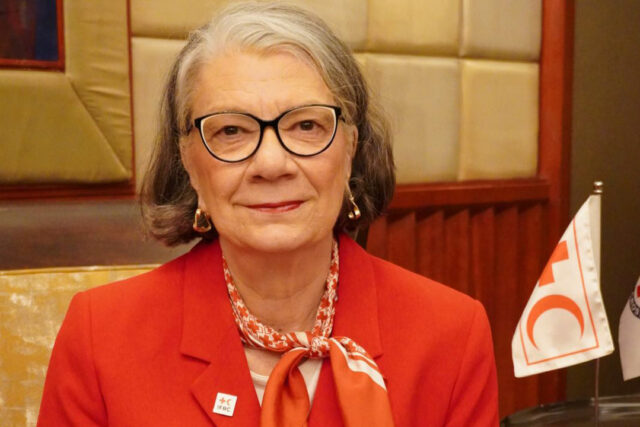
By Chloe Mari A. Hufana
COMMUNITIES are “never informed enough” on basic health and safety, and disaster preparedness, according to International Federation of Red Cross and Red Crescent Societies (IFRC) President Kate Forbes.
“People are never informed enough. You have to constantly remind everyone, me included,” Ms. Forbes told BusinessWorld in an interview at a hotel in Makati City on Wednesday.
“I need to be reminded at home to be sure to take care of myself. Take water in the summer, to keep my first aid certification up, to be knowledgeable, to listen to the weather.”
In Manila for her first stop in Asia, she underscored the importance of taking personal responsibility to learn more about disaster preparedness.
She lauded the Philippine Red Cross (PRC) for its high engagement in the country, with over 40,000 centers. The Philippines is one of the countries with very significant Red Cross visibility in the world.
“In the near term, it appears we’re going to continue to see [more] disasters, and [the PRC is going] to be responsible for each of us to train ourselves and protect our families and to listen to us,” said Ms. Forbes.
She lauded the Philippines, saying the country’s disaster response is impressive. She credited this to the Filipinos’ ability to make adjustments and to technological advancements in disaster response.
“I visited the operations center yesterday, and the fact that the PRC is in over 40,000 villages throughout [the country] and the fact that they can get real-time data is absolutely impressive,” she said.
In particular, Ms. Forbes mentioned the PRC’s real-time earthquake monitoring and shift to reusable energy to cope with the effects of calamities.
AI INTEGRATION
The IFRC is turning to the use of artificial intelligence (AI) to predict public health issues, such as cholera, and to protect migration.
“I think the Philippines has a very good system now. But they’re also realizing that they’re going to have to incorporate more artificial intelligence and more early data,” she said, adding that the IFRC needs to collect more data globally to help disaster-prone countries like the Philippines further.
She urged the continued and intensified partnership between the Philippine government and the PRC to improve the country’s disaster response.
“There’s a real willingness and a tradition of the government being supportive of the Red Cross and Red Crescent movement, as well as the Filipino Red Cross,” she said. “The planning’s part of it, helping support early warning systems is critical; and allowing the Red Cross to have access, which the government has done, is very important.”
The IFRC is the world’s largest humanitarian network, with a presence in over 190 countries and territories.
Ms. Forbes is only the second woman to occupy the highest seat of the organization since its establishment in 1919.
This visit marks the second time an IFRC President has visited the Philippines.
‘GAZA CEASEFIRE’
Meanwhile, Ms. Forbes urged for warring Israel and Hamas, and the governments worldwide to have a ceasefire in Gaza for the IFRC to continue its humanitarian work.
“We have to have a ceasefire so that we can have access into Gaza,” she said. “We are prepared to get aid in. We are prepared with our volunteers to really help those who need it. But we have to have more access.”
Last February, she met with hostages and families of hostages in Israel.
The protection of the IFRC emblem is necessary for them to fulfill their mandate, she said, sharing the loss of IFRC volunteers in Sudan days ago.
“I call on all governments to abide by the Geneva Conventions and all governments who have any influence on any place where there is a war to bring us an environment where we can bring aid into the people,” she added.
The Geneva Conventions of 1949 and their Additional Protocols are the core of international humanitarian law, regulating the conduct of warfare to limit its effects. These international agreements protect civilians and aid workers.
Last October 2023, the militant group Hamas attacked a concert in Western Israel, killing 364 civilians.
This exacerbated the ongoing hostilities between Hamas and Israel, where the death toll reached over 36,000.
Open Philippines to climate change refugees from Pacific nations — congressmen
CONGRESSMEN are seeking to open the Philippines to refugees from climate-stricken nations to provide them safe haven in times of natural disasters and emergencies.
House Bill (HB) No. 10490, filed last Monday, seeks to amend the Philippine Immigration Act of 1940 by allowing the Philippine President to admit environmental refugees from residents of developing island states in the Pacific Ocean for humanitarian reasons.
“It is a proactive measure that not only addresses the immediate needs of climate refugees but also sets a precedent for global responses to similar crises,” Party-list Rep. Samuel S. Versoza, Jr. said in a statement.
Home to at least 65 million people, the Pacific island nations of Kiribati, Vanuatu, and Fiji face imminent danger from intensifying tropical storms and increasing levels due to climate change, which could prompt its citizens to seek refuge in other countries, the authors of the bill said.
“The Pacific islands of Kiribati, Vanuatu, and Fiji are in imminent danger of being underwater in the next decade due to the rise of sea levels,” HB No. 10490’s explanatory note read.
Authored by Albay Rep. Edcel C. Lagman, Sr., Cebu Rep. Pablo John F. Garcia, Lanao del Sur Rep. Ziaur Rahman A. Adiong, Surigao del Norte Rep. Robert Ace S. Barbers, and Mr. Versoza, the bill seeks to give flexibility to Philippine immigration laws by allowing “environmental migrants” access to the country “due to climate-change related harm.
“This legislation is a testament to our commitment to upholding human rights and our international responsibility,” Mr. Versoza said.
The implementing agencies of the proposed measure would be composed of the Department of Justice, Foreign Affairs, Bureau of Immigration, and the Commission on Human Rights.
DoH funds enough to buy new vaccines to fight COVID-19 surge
By Kenneth Christiane L. Basilio
THE DEPARTMENT of Health (DoH) will be pooling its unused funds to purchase a sufficient volume of new vaccines to combat emerging variants of the coronavirus disease (COVID-19).
“If there’s a need to provide something for the emerging [COVID-19] variant, we can always make some modifications within our budget,” Health Undersecretary Achilles Gerard C. Bravo told Wednesday’s House panel hearing.
The DoH is “collating all the resources” of its unused funds to modify and transfer them to “fast-moving appropriations” to support the government’s preparation spending for the disease, he added.
During the hearing, Marikina Rep. Stella Luz A. Quimbo questioned the department’s budget management. “There is a quick response fund… of [P970 million] that could be used, at the same time we have a communicable disease program that the DoH hasn’t used,” she said in Filipino.
“What we will do is that we have so many funds at the DoH, even from the [continuing appropriations] in 2023 and the current,” replied Mr. Bravo said, assuring the panel that funds and mechanisms are in place to purchase vaccines to combat a COVID-19 surge.
The health department has allotted P970 million for its quick response fund as of March 2024 which could be used to prepare for the new COVID-19 variant, he said.
DoH: NO TRAVEL RESTRICTIONS
On Tuesday night, the DoH said it does not see the need to impose travel restrictions even as the country faces rising COVID-19 cases potentially spurred by new subvariants.
“There’s still no scientific basis for travel restrictions to any country because of an increase in COVID-19 cases,” it said in a statement, noting the local situation “to be to be mild and manageable.”
All Philippine regions remain at low risk from the virus, it added.
The DoH has been tracking “newly designated variants under monitoring,” as its Southeast Asian Singapore faces an uptick in cases spurred by KP.1 and KP.2, which both belong to a new family of subvariants nicknamed as “FLiRT.”
From May 14 to 20, the Philippines had an average daily cases of 202, fewer than about 500 per day at the start of 2024. It’s also lower than 1,750 per day in the middle of May 2023, it added.
“Out of the new cases reported for the said week, 16 had severe or critical disease,” it said, adding that 12 deaths had been recorded, five of which were logged from May 7 to 20.
KP.1 and KP.2, which the World Health Organization (WHO) has labeled as a variant under monitoring and has been widely seen in the United States recently, have been linked to rising COVID-19 cases in Singapore.
Singapore, whose COVID-19 cases had risen to 25,900 cases from May 5 to 11 from 13,700 a week earlier, was expecting its new infection wave to peak in the coming weeks.
The University of the Philippines – Philippine Genome Center and the Research Institute for Tropical Medicine continue with their sequencing efforts.
The Health department said the flagged Omicron subvariants KP.2 and KP.3 are “already likely here” but noted that “cases continue to be clinically mild and manageable.”
The agency said it avoids using “FLiRT,” a coin used by researchers to describe amino acid changes in the COVID-19 virus’ spike protein, to refer to the subvariants “as the term is informal and casual.”
“Using it might result in a miscommunication of health risk. There is still no evidence now that the KP.2 and KP.3 variants are causing severe to critical COVID-19, both locally and internationally,” it added.
As of May 18, only 12% or 141 of 1,155 of intensive care unit (ICU) beds for COVID-19 patients had been occupied, it said.
The agency said 1,435 or 14% of 10,356 COVID-19 beds had been used.
Severe and critical COVID-19 cases admitted in various hospitals account for 151 or 9% of total admissions, it added.
“The average number of daily reported severe, critical, and ICU COVID-19 admissions as of May 18 is much less than its level in the middle of May 2023.” — with a report from Kyle Aristophere T. Atienza
BIR urged to boost info drive on new invoicing rule to avoid fines
By John Victor D. Ordoñez, Reporter
A PHILIPPINE senator is urging the Bureau of Internal Revenue (BIR) to double up on efforts to inform taxpayers of a new rule requiring invoices instead of official receipts when filing taxes, to spare companies from unnecessary penalties. Under the new Ease of Paying Taxes Act, signed by President Ferdinand R. Marcos, Jr. in January, taxpayers must start issuing valid invoices instead of official receipts in declaring output taxes and claiming input taxes for both sales of goods and services.
If a sale is exempt from value-added tax (VAT) the term “VAT-exempt sale” must be written or printed on the invoice.
“I urge the BIR to enhance its information dissemination campaign on the changes brought about by the Ease of Paying Taxes Act, particularly on the issuance of invoices in place of official receipts to ensure that taxpayers are well-informed on the said changes,” Senator Sherwin T. Gatchalian, who sponsored the Senate bill of the measure, said in a statement.
“All applications and communications with the BIR should be conducted through online channels and taxpayers should not be required to visit BIR branches in person,” he added.
Taxpayers who fail to file any return with proper documents and pay the taxes due would be liable to a 25% penalty of the amount due under the new law.
The new law allows returns to be filed electronically and manually with any authorized agent bank, Revenue District Office, tax software provider.
The invoicing regulation took effect on April 27 while the deadline for companies to report unused receipts was on May 27.
“The BIR should ensure that the implementation of this particular provision of the law, intended to streamline issuance of proof of transactions, will not entail additional cost and burden on enterprises, especially those belonging to the micro, small and medium sector,” Mr. Gatchalian said.
13 Pinoys safe after Houthi strike
THE 13 FILIPINOS aboard a bulk carrier hit by four missiles launched by Houthi rebels in the middle of the Yemeni coast last Tuesday are all safe, the Department of Migrant Workers (DMW) said Wednesday.
In a statement, the DMW said the assurance was relayed by the shipping company’s local manning agency even as the vessel sustained “some damage” from the attack.
“The vessel is continuing its voyage to its next port of call,” it said. “The DMW is communicating with the shipping and manning agencies, monitoring the safety and condition of our Filipino seafarers.”
The Iran-backed Houthi militants have launched more than 50 attacks in the Red Sea since November in what they say is “in solidarity with Palestinians,” Reuters reported on May 29. — John Victor D. Ordoñez
It’s rainy season, says PAGASA
THE STATE weather service on Wednesday declared the start of the rainy season, after signification rains showers from the recent typhoon and the Southwest Monsoon.
In a statement, the Philippine Atmospheric, Geophysical and Astronomical Services Administration (PAGASA) said that the occurrence of “scattered rainshowers, frequent thunderstorms, the passage of Typhoon “Aghon,” and the Southwest Monsoon (Habagat) “had met its criteria in declaring the start of the country’s rainy season.
It added that that increased likelihood of the La Niña event increases the likelihood of above-normal rainfall conditions in some areas of the country, especially towards the end of the year.
PAGASA said earlier that there was a 60% chance of La Niña occurring between June and August.
“There may be breaks in rainfall that extend over a few days or weeks, also referred to as monsoon breaks,” it added.
PAGASA said that it would continue to monitor the weather and climate situation of the country.
“The public and all concerned agencies are advised to take precautionary measures against the adverse impacts of the rainy season, Habagat, and the impending La Niña such as floods and rain-induced landslides,” it added. — Adrian H. Halili
PSEi falls to 6,400 level on weak growth outlook
THE BENCHMARK INDEX retreated to the 6,400 level for the first time in over a month on Wednesday on expectations that economic growth would miss the government’s target for this and next year.
The Philippine Stock Exchange index (PSEi) fell by 1.38% or 89.93 points to finish at 6,411.41 on Wednesday, while the broader all shares index dropped by 0.94% or 33 points to end at 3,451.74.
This was the PSEi’s worst finish since it closed at 6,404.97 on April 16. This was also below the market’s end-2023 close of 6,450.04.
“The local bourse dropped as the sentiment was dampened by the latest Monetary Policy Report, which stated that the Bangko Sentral ng Pilipinas (BSP) sees the Philippines’ economic growth to miss the government’s target in 2024 and 2025 due to the impact of high interest rates,” Philstocks Financial, Inc. Research Analyst Claire T. Alviar said in a Viber message.
“Overseas, most Asian markets also traded lower as investors assessed inflation rates in the region,” she added.
The BSP’s report said the Philippine economy could operate “slightly below potential,” with gross domestic product (GDP) expansion seen settling below the government’s growth targets of 6-7% for 2024 and 6.5-7.5% for 2025.
Philippine GDP grew by 5.7% in the first quarter, faster than 5.5% in the previous quarter but slower than 6.4% a year ago, latest data showed.
“Philippine shares succumbed to more profit taking as the index sank to 6,400 as concerns over inflation, weak demand at a Treasury auction, and cautious statements from policy makers dampened sentiment,” Regina Capital Development Corp. Head of Sales Luis A. Limlingan said in a Viber message.
“Geopolitical tensions, like US-China issues impacting Boeing, and fluctuations in vaccine stocks due to bird flu concerns, added to volatility,” Mr. Limlingan added.
All sectoral indices ended lower on Wednesday. Financials lost 2.35% or 47.14 points to close at 1,952.41; services declined by 1.67% or 32.78 points to 1,928.35; property went down by 1.23% or 30.17 points to 2,404.75; mining and oil dropped by 0.67% or 62.39 points to 9,226.56; industrials retreated by 0.5% or 45.69 points to 9,076.12; and holding firms decreased by 0.45% or 26.4 points to 5,761.80.
“Among the index members, BDO Unibank, Inc. and Metropolitan Bank & Trust Co. weighed down not just their sector but the entire PSEi, losing 3.7% and 3.32%, respectively. Meanwhile, four stocks were able to post gains, with Manila Electric Co. gaining the most, up by 0.87%,” Ms. Alviar said.
Value turnover went up to P5.41 billion on Wednesday with 685.45 million shares changing hands from the P5.27 billion with 583.14 million issues traded on Tuesday.
Decliners overwhelmed advancers, 127 versus 70, while 40 names closed unchanged.
Net foreign selling went down to P763 million on Wednesday from P784.38 million on Tuesday. — RMDO
Peso falls to new 18-month low as US Treasury yields increase
THE PESO fell to a new 18-month low against the dollar on Wednesday amid hawkish comments from a US Federal Reserve official, which pushed up Treasury yields.
The local unit closed at P58.42 per dollar on Wednesday, weakening by 45 centavos from its P57.97 finish on Tuesday, Bankers Association of the Philippines data showed.
This was the peso’s worst finish in over 18 months or since its P58.58-per-dollar close on Nov. 7, 2022.
The local unit is now down by P3.05 from its end-2023 close of P55.37 versus the greenback.
The peso opened Wednesday’s session weaker at P58.07 against the dollar, which was already its best showing for the day. It dropped to as low as P58.51 versus the greenback.
Dollars exchanged increased to $1.4 billion on Wednesday from $1.24 billion on Tuesday.
The peso weakened versus the dollar as hawkish statements from Minneapolis Fed President Neel Kashkari caused US Treasury yields to go up, Rizal Commercial Banking Corp. Chief Economist Michael L. Ricafort said in a Viber message.
Stronger-than-expected US consumer confidence data pushed up US Treasuries, causing the peso to depreciate, Security Bank Corp. Chief Economist Robert Dan J. Roces said in a Viber message.
“The Philippine peso experienced the most significant drop among emerging Asian currencies,” Mr. Roces said.
US government bond yields pushed to a near four-week peak on Wednesday, lifting their global counterparts and pressuring stocks, as data sowed new doubts about the timing and extent of Federal Reserve rate cuts, Reuters reported.
US yields climbed after consumer confidence data came in stronger than expected on Tuesday, Mr. Kashkari said further rate hikes were still a possibility, and two Treasury auctions were poorly received by investors.
The benchmark 10-year US Treasury yield rose as high as 4.576%, a level not seen since May 3, and was last up 2 basis points at 4.566%.
Mr. Kashkari said Tuesday he is still not ruling out an interest rate hike, but it’s more likely the central bank could hold rates steady for an “extended” time as it waits for inflation to drop.
“We could sit here for as long as necessary until we get convinced that inflation is sustainably going back down to our 2% target,” the Fed policy maker said.
While holding rates at their current 23-year high “for an extended period of time is a more likely outcome,” Mr. Kashkari made it clear that other options are on the table if inflation doesn’t fall.
For Thursday, Mr. Ricafort expects the peso to range from P58.30 to P58.50 per dollar. — A.M.C. Sy with Reuters
Make annulments free — Garin
A CONGRESSWOMAN called on the Senate on Wednesday to work to make annulment in the Philippines free should it reject the divorce bill already passed by the House of Representatives.
Referring to annulment as the “compromised” version of the divorce bill, Iloilo Rep. Janette L. Garin said it would only be fair for married Filipinos seeking to break off their union to have it free of charge.
“In case the (divorce) measure won’t pass in the Senate, what we can do is make annulment free instead,” Ms. Garin said in a statement in Filipino. “The charge for annulment shouldn’t be expensive. Life is already difficult that people won’t spend on annulment… Because of the [annulment] fees, they just choose to endure [their dysfunctional union].”
The Philippines is the only country in the world besides the Vatican City outlawing divorce.
The House of Representatives last week approved House Bill (HB) No. 9349, a measure seeking to reinstitute divorce as another mode for terminating marriage in a 131-109-20 vote.
Its Senate counterpart, Senate Bill No. 2443, meanwhile is pending for second reading since September last year.
The Senate’s version of divorce bill remains uncertain as five senators have said they don’t support the measure, according to an informal survey conducted by Senate President Pro-Tempore Jose “Jinggoy” P. Estrada.
Those reportedly in favor of divorce are Senators Ana Theresia N. Hontiveros-Baraquel, Mary Grace N. Poe-Llamanzares, Maria Imelda “Imee” R. Marcos, Pia Juliana S. Cayetano, and Ferdinand “Robin” C. Padilla.
There is no need to wait for plenary affirmation of the corrected tally of votes on HB No. 9349 as it would not change the outcome of the bill’s approval, Albay Rep. Edcel C. Lagman, Sr. said in a letter made available to reporters on Wednesday.
“Our legal department is studying Cong. Lagman’s letter,” Mr. Velasco told BusinessWorld in a Viber message.
“The purported reason for the delay is that there is need to report for the Plenary’s action the corrected affirmative votes from 126 to 131,” Mr. Lagman stated in a letter to House Secretary General Reginald S. Velasco.
Mr. Velasco issued a correction of the tally Thursday last week, a day after the proposed measure hurdled the House on final reading. The initial vote tallied by House secretariats showed 126 affirmative votes for the bill, 109 against, and 20 who abstained.
The correction was due to “administrative error,” he told the media last week.
“The rectification in the Records of the House will be done when Session resumes this July 2024,” he said in a statement. — Kenneth Christiane L. Basilio
Escudero eyes Czech partnerships
NEW SENATE President Francis “Chiz” G. Escudero and Czech Ambassador to the Philippines Karel Hejc on Tuesday discussed boosting ties in agriculture, energy and defense following President Ferdinand R. Marcos, Jr.’s visit to the Czech Republic in March.
In a statement on Wednesday, the Senate Public Relations and Information Bureau said Mr. Escudero told the envoy that Manila is also seeking more ties in science and technology.
“Some of the agreements reached during President Ferdinand R. Marcos, Jr.’s visit have already taken off,” Mr. Hejc said, citing new tie-ups in agriculture, energy, and defense between both countries.
The Czech ambassador also expressed concern over the tensions between Manila and Beijing in the South China Sea, saying it could spill over to other countries if they continue to worsen.
Mr. Marcos met with Czech Republic Prime Minister Petr Fiala in the Czech Republic to discuss posting labor ties and establishing a labor consultation mechanism between the Philippine Department of Migrant Workers and the Czech Ministry of Labor and Social Affairs.
“As you know, we rely on our friends from the international community to help us as we strive to give our people a better country and a better future,” Mr. Escudero said. — John Victor D. Ordoñez

